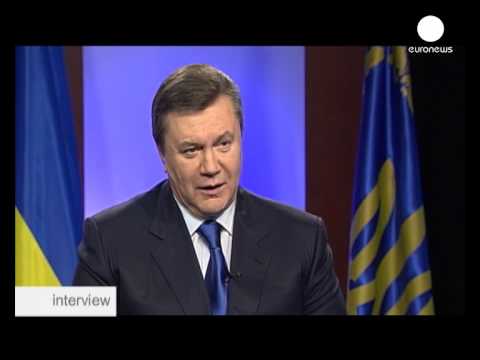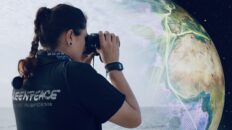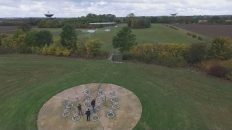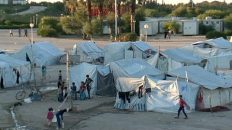Having narrowly won Ukraine’s presidential election in February, former opposition leader Viktor Yanukovich has now been sworn in. He chose Brussels for his first foreign visit as new head of state. It came a few days before he headed to Moscow. euronews’s Denis Loktev interviewed him in the European capital.
Denis Loktev, euronews: Mr President, you’re regarded as a pro-Russian politician, compared to your more pro-Western opponents… Why choose Brussels and not Moscow for this first international visit?
Viktor Yanukovich: Well, basically, because I had two invitations: one for the first of March, and another for the fifth. What I intend to do is pursue a balanced policy to meet Ukraine’s interests. I want both Europe and Russia to have a reliable partner in Ukraine.
euronews: How will Ukraine’s relations with Europe be different, compared to the presidency of Viktor Yushchenko, who aimed for Ukrainian accession to the European Union and NATO?
Yanukovich: I think that we will definitely take a step from talk to action; that’s the main thing I’m going to change. Our relationship should become better-defined. I think that the goal of European integration, above all, is to bring about reform in Ukraine. I will begin these necessary reforms. Everything we do, every ‘next step’ should contribute to this goal.
euronews: So are you keeping or are you rejecting the goal of joining the EU and NATO?
Yanukovich: We will definitely continue our European integration process. As for Ukraine joining NATO, this issue is not currently on our agenda, and it is difficult to say when it will be. Today the state of society is such that the excessive politicisation of this issue only contributes to political instability and divides society. My goal is to unite the Ukrainian people, to make Ukraine a stable territory, a reliable and predictable partner.
euronews: It seems that your voters expect from you not so much a rapprochement with the West, but rather a restoration of relations with Russia. How exactly will it be expressed?
Yanukovich: I think that now we must repair the deficiency which we had in our relationship with Russia. The future relations I see between Ukraine and Russia are the relationship of friendly countries, a partnership, good-neighborliness that will serve the interests of the Ukrainian and Russian peoples. I would say that both our peoples would like to restore the traditional relations, and they expect that from the policies of the heads of state of Ukraine and Russia.
euronews: So, to improve relations, what will your polical moves be, exactly? For instance, will Ukraine recognise independence in Abkhazia and South Ossetia?
Yanukovich: I told earlier that we oppose the policy of double standards, like the example of Serbia, for the recognition of Montenegro’s… I mean the recognition of Kosovo’s independence, and even then it was clear that the problems in areas of frozen conflicts will only worsen. The next striking example was an example of North Ossetia [sic]. Therefore, my point of view is that we should emphasise once again, as soon as possible, that the international rules, rules that should work for everyone, should not have exceptions.
euronews: Meaning? Are you ready to recognise South Ossetia and Abkhazia independence?
Yanukovich: Currently this issue is not on the agenda. We’re facing a precedent which could have been avoided. Nevertheless, it was allowed.
euronews: Are you waiting for any reciprocal steps by Russia before becoming more clear on this?
Yanukovich: I think that these issues will be discussed in the near future, during my visit to Russia.
euronews: Is Ukraine interested in joining the Customs Union being established by Russia, Belarus and Kazakhstan?
Yanukovich: Yes, but we do not yet know the rules. We don’t understand what we role would we be playing. And, secondly, Ukraine nowadays is a member of the World Trade Organization, and if such an alliance is possible, it is only possible within the WTO rules. This question of course requires deep reflection. We have to weigh and understand our benefits and the benefits of our partners from such a union, and how it will fit into the framework of membership in the World Trade Organization. I believe that if we talk about the future we would very much like to see our partners Russia, Kazakhstan, and Belarus become members of the WTO. Then we will be closer to the goal we’re talking about.
euronews: Turning to one of the most conflictual points in relations between Ukraine and Russia, gas prices and transit tariffs: do you expect to have easier negotiations with Moscow than your predecessor?
Yanukovich: I am sure that this issue will be on the agenda during my visit to Moscow, and we’ll have an answer very soon. Of course, this question is now very important to the Ukraine, because we believe that today’s gas prices for Ukraine are, to put it mildly, unfair. And we would not want to build relationships with our partners, with Russia, based on such unfavorable conditions for Ukraine.
euronews: What price would you consider fair?
Yanukovich: I think that it’s a question to be negotiated along with all the multiple issues which we are accustomed to solving with Russia – as they say traditionally, “in the same package”.





